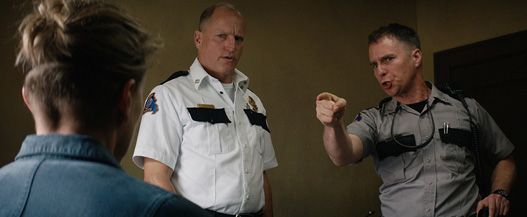Movie Review: Three Billboards Outside Ebbing, Missouri
By Matthew Huntley
December 7, 2017
I think one of the issues is that we're never quite sure whether we're supposed to take the film as reality or as some kind of fantasy in which Mildred is the underdog-turned-hero. Some scenes, for instance, are raw, serious, and embody deep truth and humanity, as when Mildred becomes sort of a mother figure to Willoughby after he reveals a secret he thinks no one else in town knows about, or when Willoughby makes a major life decision that subsequently influences the behavior and compassion of others.
Most scenes, however, only start out as if they will have something powerful to convey before descending into such brazen incredulity that we can't help but feel they're going too far and the movie is all too willing to compromise its own reality just to push the audience's buttons. For starters, I didn't buy the whole dentist office fight scene, which seems better suited for a horror film than a human drama. Or ta potential domestic abuse scene between Mildred, her ex-husband and Robbie, which ends up feeling more awkward than effective—one minute, things are violent; the next, everything is okay and nobody is talking about what just happened. And then there's an entire arson scene that comes off as loud and over-the-top, not only with regards to the action, but also the aftermath when James (Peter Dinklage), the “town midget,” as he is known, saves the would-be victim, who just happened to insult James earlier in the film. And then for the new sheriff (Clarke Peters) to believe James' story after the fact seemed kind of ridiculous.
Another flaw is the way young women are portrayed in the film. They're painted as either ditzes or bitches with no room or opportunities for them to prove otherwise. As Mildred's ex-husband's 19-year-old girlfriend, I doubt Samara Weaving is as clueless as the screenplay makes her character out to be. Would she really not know the difference between polo and polio? The same goes for Kerry Condon as the office assistant in the advertising office and Kathryn Newton as Mildred's daughter, who we see in a flashback. The only woman in the film with any kind of depth is Mildred, and perhaps the others were given less weight and dimension to make Mildred stand out that much more, but this strategy draws negative attention to their characters.
Unfortunately, “Three Billboards”' fallacies get the better of it and they're what we remember most when leaving the theater, which is a shame because the film's acting and energy are so good. Each performer is on the top of his and her game here, displaying conviction, enthusiasm and presence in every scene. McDormand, Harrelson, and Rockwell have good chemistry with one another and are perfectly suited to their roles, always in control and never overreaching.
The same cannot be said of the screenplay, the events of which are just too convenient and leave us in a state of disbelief and disappointment. I'm all for the mixing of genres (why can't a tragic story about rape and murder also have darkly comic undertones?), but the various genres mixed into “Three Billboards” can't quite find a way to co-exist in a believable way so that we buy what the movie is trying to sell. McDonagh is no doubt a gifted filmmaker and I'm confident he'll return to a higher form of storytelling, the kind that seeks to arouse us with truth instead of play us with pretense.
Continued:
1
2
|
|
|
|




